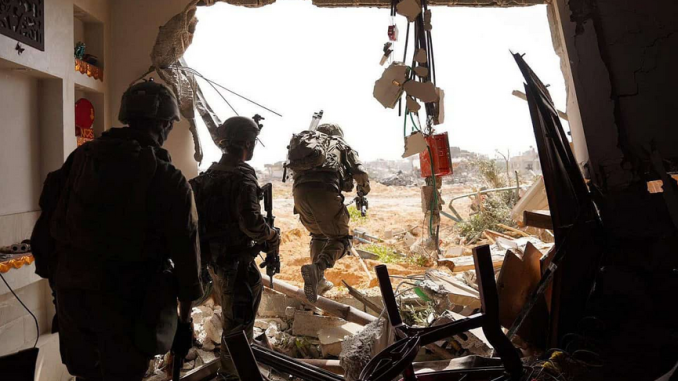Washington warns Israel against ground invasion into Lebanon
Shannon Walsh & Enia Krivine | Sept 25, 2024
 Israeli ground troops operating in the Rafah area of southern Gaza, June 1, 2024. Credit: IDF.
Israeli ground troops operating in the Rafah area of southern Gaza, June 1, 2024. Credit: IDF.
A senior Biden administration official said on Monday that the United States opposed an Israeli ground invasion into Lebanon to push the Iranian-backed Hezbollah terror group from its border. U.S. officials have previously cautioned that an all-out war between Israel and Hezbollah could have “catastrophic” consequences and that the Jewish state may “pay a heavy price without achieving its goals.” Undoubtedly, a ground operation is laden with risk. Yet since Hamas launched its war against Israel on Oct. 7, Washington has often tried to constrain Israel’s military operations by publicly casting doubt on the Jewish state’s ability to achieve its war aims. And Israel has repeatedly demonstrated that Washington’s fears were unsubstantiated.
During the first hours of the Oct. 7 attack, Hamas fired 3,000 rockets at the Jewish state as thousands of terrorists flooded into southern Israel to rape, burn, massacre and kidnap Israelis. It quickly became clear that a major ground operation in the Gaza Strip would be necessary to return the hostages and defang Hamas.
Yet the White House reportedly tried to prevent Israel from carrying out a major ground offensive, concerned that it would endanger a hostage deal and cause too many casualties on both sides. Former CENTCOM commander Kenneth (“Frank”) Mackenzie warned that a ground operation would be a “bloodbath for everybody.”
Nonetheless, just weeks after the ground incursion began on Oct. 27, Israel negotiated the release of 105 hostages. And while the Israel Defense Forces have paid a heavy price on the battlefield in Gaza—the total number of fatalities to date for the Irons Swords war is 715—the number remains lower than some predicted.
In March, Israeli Prime Minister Benjamin Netanyahu approved IDF plans to enter Rafah, Gaza’s southernmost city. Rafah lies adjacent to the enclave’s approximately nine-mile border with Egypt, under which Hamas had constructed a network of smuggling tunnels that it used to build its rocket arsenal. Jerusalem said that the IDF must enter Rafah to close the tunnel network, destroy the last four intact Hamas battalions and search for hostages in the city.
But Jerusalem’s plans to evacuate more than a million Gazans before the Rafah operation triggered consternation from the White House. Vice President Kamala Harris warned against the mass evacuation, claiming: “I have studied the maps. … There’s nowhere for those folks to go.” If Israel moved forward, she said there could be consequences from Washington. U.S. President Joe Biden warned that a major IDF military operation in Rafah was a “red line.” The administration even attempted to restrain Israel by withholding critical munitions.
Despite Washington’s threats, the IDF advanced the Rafah operation in May, successfully evacuating almost a million Gazan civilians to humanitarian zones in two weeks. In Rafah, the IDF discovered significant terrorist infrastructure and weaponry, and was able to destroy more than 50 smuggling tunnels that extended into Egypt, denying Hamas the ability to rearm or escape. The Rafah operation also resulted in the rescue of Israeli hostage Qaid Farhan Alkadi and the repatriation of the bodies of several hostages executed by Hamas.
At the end of June, Netanyahu announced that the intensive phase of the war in Rafah was near complete. The catastrophic humanitarian fallout that Washington had predicted never materialized.
The Biden administration hasn’t just been wrong on Gaza. In April, following the alleged Israeli assassination of several Islamic Revolutionary Guard Corps members in Syria, the regime in Tehran attacked the Jewish state with an array of 300 missiles and attack drones. The IDF worked with a U.S.-led coalition of allies to successfully defend against the barrage, sustaining only minimal damage and the wounding of one Bedouin girl.
After successfully repelling the massive Iranian attack, Biden’s advice to Israel was to “take the win” and stand down, fearing any Israeli response would trigger an all-out regional war. Despite Biden’s recommendation, Jerusalem opted for a measured response to Tehran, destroying its air-defense systems near the Iranian city of Esfahan, where key parts of Iran’s illicit nuclear-program reside. Tehran has yet to retaliate.
Last week, senior adviser for the Biden administration Amos Hochstein warned Netanyahu against initiating war with Lebanon. The following day, thousands of communications devices belonging to Hezbollah members were remotely detonated, killing dozens and wounding more than 3,000 across Lebanon and Syria. The Israeli Air Force has also engaged in intensified attacks against Hezbollah in recent days, targeting launchers and weapons caches throughout Lebanon.
As Jerusalem eyes further steps, including a potential ground invasion, to remove Hezbollah from its northern border, aiming to enable tens of thousands of evacuated Israelis to return to their homes, the Biden administration should separate its diplomatic agenda from its military advice. The United States is Israel’s greatest ally, yet its advice is most likely to be persuasive when Jerusalem perceives it to be realistic.



IL needs to increase its self-reliance.
This seems to point to the reason the US hasn’t won a war since WWII. It’s essentially a highly litigious society and …
Too many lawyers = Too much talk
The US believes it can talk its way out of any situation, but more pragmatic people understand otherwise. Survival demands action, not words.
Just think of the situation if Israel had not insisted on the removal of the “kill switch” in those beautiful F35s. Our “allies” would have grounded them for the duration.
This leaves the question of why Israel would acquire the F35s at all if they can’t be employed for the intended purpose. (Luckily no longer a problem)